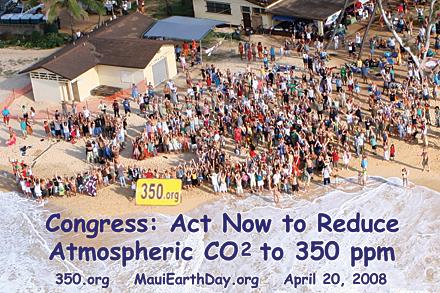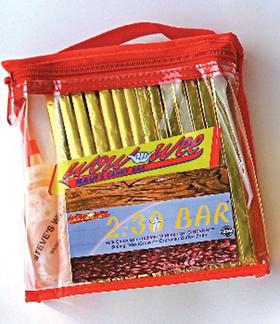Updates on issues from past columns
by Rob ParsonsJune 19, 2008
This week, it's time to update a few stories covered in past columns. I'll nibble a little bit of this, and chew on a bit of that?
On The Beach
In "Global Warning" (Apr. 24) I covered the recent efforts of author/environmentalist Bill McKibben, who spoke at Earth Day festivities at Maui Community College. Bill's 350.org campaign had just been launched as a way to spread the word of the need to reduce our carbon emissions worldwide, bringing CO2 to a safe level of 350 parts per million.
Springing into action, the volunteers designed a banner and, four days after McKibben's visit, hundreds of Earth Day revelers at Baldwin Beach Park held it aloft for a helicopter flyover and photo. The aerial shot and accompanying story were quickly posted to the 350.org website and can still be found on their blog page. But for those of you who crave immediate gratification, here's the photo.
 |
 |
 |
The Earth Day Photo
It's In The Bag
"Drastic Plastic" (May 1) delved into our throwaway culture, and the efforts of one company, Styrophobia, to educate our community on better choices.
Looks like our County Council has a choice to make as well, as the plastic bag ban ordinance has finally been scheduled for deliberation. The Council Public Works Committee will consider the proposed bill on Wednesday, June 18th, and if it passes it will require two readings at full Council before it can be signed into law.
Anyone who has driven along our island highways can see that plastic bags are the favorite plaything of our rascally trade winds. They're not only an eyesore, but actually cost our county big bucks, much of it spent in a contract to pick up bags around the Central Maui Landfill on gusty Pulehu Road.
Cloth shopping bags are back in vogue, are washable and reusable Such a deal! And Judy Edwards sent this quote as a reminder that plastic is indeed drastic: "Except for a small amount that's been incinerated, every bit of plastic manufactured in the world for the last fifty years or so still remains. It's somewhere in the environment."
Let's Get Growing
"Down on Patrick's Farm" (Oct.4) investigated biodynamic growing methods, and the successful model of Community Supported Agriculture by one small Peahi farm operation. "More Food For Thought" (Oct 18) reported on Maui Aloha `Aina's sixth annual Body & Soil conference and the links between soil health, plant health, and human health.
Food prices are on the rise, fueled by transportation costs due to surging oil prices. It seems as though our leaders have been more concerned with seeking renewable energy sources to combat rising cost, than in securing our local food supply.
To help deliver the urgent message of the need to offset our 85 percent dependence upon imported food, Maui Tomorrow's Food Initiative and Renewable Energy committee recently met with Mayor Charmaine Tavares and County Ag Specialist Clark Hashimoto.
The centerpiece in the Mayor's conference room was an enormous basket filled with local organic produce, a reminder of the cornucopia of abundance available here on Maui. Initial conversations took place about increasing local food production, supporting regional compost locations and community gardens, sharing resources, increasing public awareness and education, and identifying viable, collaborative steps forward.
Hawaii has set goals for inclusion of renewable energy sources, and reduction of green house gas emissions by 2020, Shouldn't we also be establishing targets for increasing the amount of food we produce for local consumption? In the event of a catastrophe the outlook is pretty bleak, other than eating lots of guavas.
It's an election year. Try asking the candidates what specific plans they have for ways the County can help its residents grow more food.
 |
 |
 |
Ginseng powered candy
A Perk That Works
"Back To His Roots" (Sept.13) described the 25 year quest of Kihei entrepreneur Steve Rose to bring the healthful benefits of American ginseng to a wider audience. Rose recently e-mailed me a press release of new products being launched, in conjunction with some great Made on Maui items.
Rose's Ginseng Strategies teamed with West Maui coffee grower Kimo Falconer to introduce blends of 100% Maui grown coffee and American ginseng. The MauiGrown Company Store in Lahaina also features "by the cup shots" of ginseng at its coffee bar.
Not buzzing yet? How about two new WOW-WEE gourmet chocolate bars? One is milk chocolate with 500mg of espresso coffee beans and 1000mg of AllAmerican (tm) Ginseng. The other is dark chocolate, 500mg of anti-oxidant green tea extract and 1000mg of ginseng.
Rose told me he's continually looking for ways to get people to try ginseng for a couple weeks, after which, he believes they can begin to notice healthful benefits. He recently made a presentation to a canoe paddling club.
Fuels Rush In
"Palm Reading" (Dec. 6) detailed a Honolulu meeting with members of the Malaysian Palm Oil Council and their claims that everything about their industry is cool. No pollution, illegal logging, slash and burn clearing or displacement of indigenous forest people or endangered species. OK, but aren't you PAID to say all of that, and what about the satellite photos showing hundreds of fires?
The cover story "Deadly Price" (Apr. 3) told the rest of the story on the Southeast Asian palm oil industry and Hawaiian Electric's (HECO) misguided plans to import huge quantities to provide our local electricity (at the expense of increasing pressures on the region's remaining rainforests and its unique and threatened creatures, such as the orangutan and Sumatran tiger.)
Imperium Renewables, which pitched a 100 million gallon/year refinery to fuel a yet-to-be built 110 megawatt generating plant at Campbell Industrial Park on Oahu, cancelled an initial public offering of stock, in part due to rising prices of vegetable oils, including soy and palm. Their plans to build on Oahu are now uncertain at best.
Nine months after announcing they had agreed to prepare a "voluntary EIS," no such environmental study has been issued by BlueEarth Biofuels, which had proposed partnering with Maui Electric (MECO) to build a biodiesel refinery with 120 million gallon/year capacity.
Last Sunday, the Honolulu Advertiser ran a feature story on ventures in Hawaii to research converting algae to biodiesel fuel. The story mentioned that BlueEarth was partnering with HECO "for an $81 million facility capable of producing 30 million gallons of biodiesel that will be used by Maui Electric Co." Oddly, that's a $20 million increase on the price tag-and a 90 million gallon reduction in yearly output of fuel-from what had previously been announced,
In any case, Pacific Biodiesel is still the only company producing biodiesel in Hawaii, and all of it is derived from waste cooking oils. Any biodiesel produced from Hawaii field crops or primordial pond scum is still years away. As it has often been stated, importing yet another fuel does nothing for our energy security or self-sufficiency.
This year's amazing version of the Maui Film Festival ran entirely on energy produced from solar panels. I know what you're thinking: how'd they pull that off with the movies shown outdoors at night. I'll leave that question to the experts.
33 year old filmmaker Josh Tickell screened his opus, Fields of Fuel to an enthusiastically receptive audience on Sunday evening at the Skydome Theater atop the roof of the Wailea Marriott hotel. Tickell's fast-paced, highly informative film chronicles his eleven year quest to learn about biofuels, to expose the powerful and toxic grasp of the petro-chemical industry and to lead the charge for self-sufficient communities, that run on vegetable oils and biomass, not fossil fuels.
Tickell toured the country in his colorful Veggie Van interviewing, filming and learning everywhere he traveled. There is fascinating footage of the historical roots of diesel engines as well as the auto industry. His fabulous integration of appropriate soundtrack choices makes the film a compelling music video tour de force, perhaps unsurpassed in the documentary genre.
Tickell's vision is biodiesel representing a shift in power from corporations back to individuals. One of the film's most poignant quotes was Senator Barabara Boxer stating, "This has become a government run by oil companies."
Tickell said the transition needed is not so much in technology, but in political power. This harkens to McKibben's MCC talk in April, when he said, "There's no shortage of technology or engineers. What we lack is political will."
Fields of Fuel will be released on DVD and to classrooms and theaters this coming fall. Don't miss it.